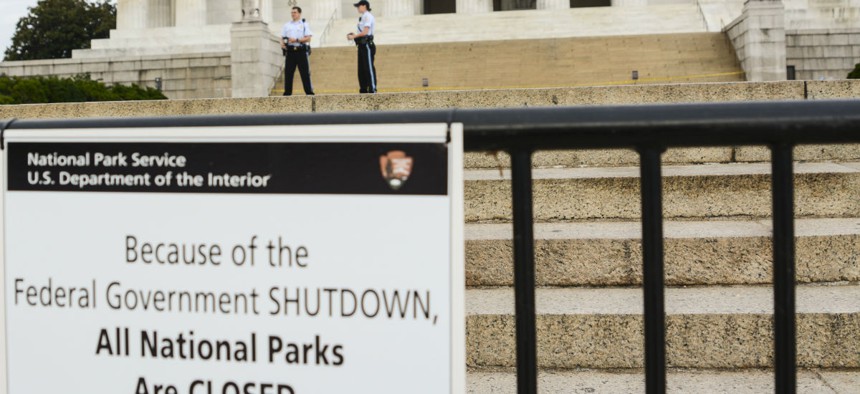
Flickr user Scott Kirkwood/NPCA
Lawmakers Seek to Protect Health Benefits During Future Shutdowns
A weekly round-up of pay and benefits news.
Bipartisan legislation introduced Tuesday would ensure federal employees affected by future government shutdowns would not be at risk of losing any of their health insurance benefits.
The Ensuring FEDVIP and FLTCIP Coverage During Shutdowns Act (H.R. 2004 and S. 973), would protect enrollees in federal employee dental, vision and long-term care insurance programs who are furloughed or forced to work without pay during a shutdown from having their plans cancelled for nonpayment.
Currently if a lapse in appropriations lasts more than two consecutive pay periods, federal workers who have gone without pay are billed for their premiums as part of the Federal Employees Dental and Vision Insurance Program, and risk their coverage lapsing. The recent 35-day partial government shutdown fell into this category.
Standard medical coverage provided through the Federal Employees Health Benefits Program does not come under threat during a shutdown—premium payments missed during the shutdown are automatically deducted from the first post-lapse paycheck. But during the shutdown, workers at unfunded agencies who had a major life event found themselves unable to make changes to their plans, like adding a newborn baby to their insurance, in part because employees at the agency responsible for processing such changes also had been furloughed.
The Ensuring FEHBP Coverage During Shutdowns Act (H.R. 2003 and S. 971) stipulates that any employee involved with enrolling workers in FEHBP or changing their enrollment would be deemed excepted during future lapses in appropriations.
The bills were sponsored by Reps. Elijah Cummings, D-Md.; Gerry Connolly, D-Va.; Mark Meadows, R-N.C.; Katherine Clark, D-Mass.; Don Young, R-Alaska; and Van Taylor, R-Texas, in the House. Sens. Tina Smith, D-Minn.; Ben Cardin, D-Md.; Chris Van Hollen, D-Md.; Sherrod Brown, D-Ohio; Tim Kaine, D-Va.; and Mark Warner, D-Va., sponsored the legislation in their chamber.
“While we truly hope to avoid shutdowns in the future, the measures we are introducing today would ensure that federal employees could enroll their newborn babies in their health insurance plans and that they would not lose their dental, vision or long-term care insurance if another funding lapse occurs,” the lawmakers said in a joint statement. “We owe it to our civil servants to mitigate the impact of funding lapses over which they have no control.”
Meanwhile, the House on Monday by voice vote approved a bill aimed at improving engagement among employees at the Homeland Security Department.
The Department of Homeland Security Morale, Recognition, Learning and Engagement Act, introduced by House Homeland Security Committee Chairman Rep. Bennie Thompson, D-Miss., would provide a number of new ways for the leadership of the department to improve morale. For the last five years, it has been ranked at the bottom of large agencies in terms of employee engagement, as measured by the Federal Employee Viewpoint Survey.
The bill would create initiatives to improve professional development at Homeland Security, allowing the department's chief human capital officer to create a career path framework and “create opportunities for leader development.” It would direct them to maintain a catalog of professional development opportunities.
It also would establish an employee engagement steering committee, made up of department officials and representatives from federal employee unions, to find ways to improve engagement. It also would allow the Homeland Security secretary to set up a non-monetary reward program for top performers.
The bill now moves to the Senate for consideration.







